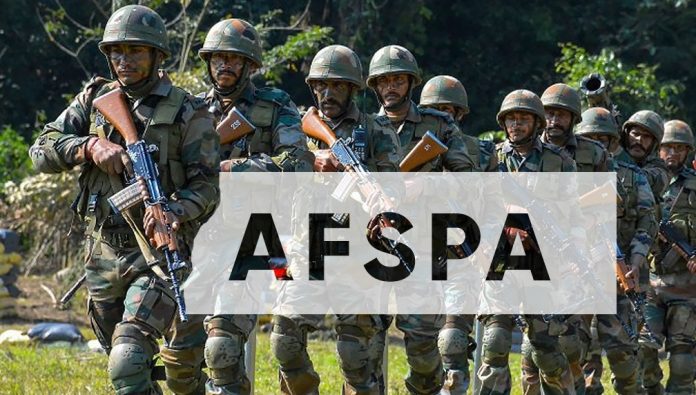By Muslim Mirror Staff
The Armed Forces Special Powers Act (AFSPA) has once again taken center stage in the northeastern region of India as the Assam Cabinet has decided to urge the government for the complete withdrawal of AFSPA from Assam.
The districts where AFSPA is still in effect in Assam, including Dibrugarh, Tinsukia, Charaideo, Sivasagar, Golaghat, Jorhat, Karbi Anglong, and Dima Hasao, continue to be designated as “disturbed areas” within the state.
Assam’s Chief Minister, Himanta Biswa Sarma, recently met with Union Home Minister Amit Shah in Delhi and announced the state government’s readiness to appeal to the central government for the withdrawal of the act. Sarma further stated that if approved by the central government, a complete withdrawal of AFSPA is expected by October of this year.
Since Sarma’s announcement regarding the removal of AFSPA in the state, widespread support has emerged for this decision. Speaking to News18, GM Srivastava, former DGP of Assam and Tripura, who played a pivotal role in counter-insurgency operations in the Northeast, expressed his views on the matter.
Srivastava noted that he initially supported AFSPA during his years of experience but believes that Assam is now prepared to do away with it. He cited a significant reduction in militancy in Assam and nearby states, attributing the current scenario to criminals fighting for their rights, who should be handled as such. Srivastava praised the Assam police’s improved capabilities and expressed confidence in their ability to maintain peace.
The demand for the repeal of AFSPA gained momentum following a Guwahati High Court verdict on March 9th of this year. The court ordered the central government to compensate the next of kin of five youths who were killed by the Army in 1994 in the Tinsukia district. This verdict has rekindled the debate over the controversial act.
Manipur Seeks Extension of AFSPA Amidst Criticism
In stark contrast to Assam’s push for withdrawal, the neighbouring state of Manipur has taken a different stance. In response to recent incidents of violence, the Manipur state cabinet has recommended maintaining the status quo and seeking an extension of AFSPA for another six months, according to recent media reports. This decision has sparked criticism from those advocating for the act’s repeal.
Critics argue that the deployment of the armed forces in civil society is a matter of global concern, as these forces are primarily trained for external threats. They also point out that the United Nations has recommended the repeal of AFSPA, and many believe that this should have been done long ago.
The AFSPA, enacted by Parliament in 1958, was initially introduced to address insurgency issues in the northeastern states following India’s independence. Over the years, the call for its withdrawal has grown louder, with concerns raised about the broad powers it grants to the Armed Forces and Central Armed Police Forces in “Disturbed Areas,” including the authority to use lethal force, make arrests without warrants, and shield personnel from prosecution without central government sanction.





![Manipur: Situation ‘tense’ but ‘under control’ in violence-hit Jiribam Members of the security forces patrol a street in Srinagar. [Representational Image]REUTERS/Cathal McNaughton](https://muslimmirror.com/eng/wp-content/uploads/2019/05/indian-security-forces-during-curfew-srinagar-150x150.jpg)

 Google News
Google News